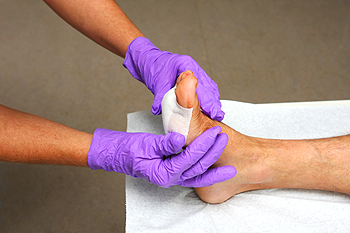 Post-traumatic wounds over the top part of the foot are injuries that occur after a traumatic event, such as an accident or severe impact. These wounds can be caused by cuts, crush injuries, or severe abrasions. When they happen, it is essential to treat them properly to prevent complications like infection or poor healing. Handling these wounds involves cleaning and dressing them to prevent infection. In more severe cases, where the skin and tissue are significantly damaged, podiatrists may use skin grafts, local tissue flaps, or free flaps for reconstruction. Skin grafts involve taking healthy skin from another part of the body to cover the wound, but they might not be as durable in the long term. Local or distant flaps are often preferred because they provide better long-term results and lower chances of permanent tightening of the skin. Reconstruction should focus on maintaining the foot's form, function, and appearance. If you have sustained such an injury, it is suggested that you schedule an appointment with a podiatrist for individualized treatment to achieve the best outcome.
Post-traumatic wounds over the top part of the foot are injuries that occur after a traumatic event, such as an accident or severe impact. These wounds can be caused by cuts, crush injuries, or severe abrasions. When they happen, it is essential to treat them properly to prevent complications like infection or poor healing. Handling these wounds involves cleaning and dressing them to prevent infection. In more severe cases, where the skin and tissue are significantly damaged, podiatrists may use skin grafts, local tissue flaps, or free flaps for reconstruction. Skin grafts involve taking healthy skin from another part of the body to cover the wound, but they might not be as durable in the long term. Local or distant flaps are often preferred because they provide better long-term results and lower chances of permanent tightening of the skin. Reconstruction should focus on maintaining the foot's form, function, and appearance. If you have sustained such an injury, it is suggested that you schedule an appointment with a podiatrist for individualized treatment to achieve the best outcome.
Wound care is an important part in dealing with diabetes. If you have diabetes and a foot wound or would like more information about wound care for diabetics, consult with Charles Passet, DPM from Forest Hills. Our doctor will assess your condition and provide you with quality foot and ankle treatment.
What Is Wound Care?
Wound care is the practice of taking proper care of a wound. This can range from the smallest to the largest of wounds. While everyone can benefit from proper wound care, it is much more important for diabetics. Diabetics often suffer from poor blood circulation which causes wounds to heal much slower than they would in a non-diabetic.
What Is the Importance of Wound Care?
While it may not seem apparent with small ulcers on the foot, for diabetics, any size ulcer can become infected. Diabetics often also suffer from neuropathy, or nerve loss. This means they might not even feel when they have an ulcer on their foot. If the wound becomes severely infected, amputation may be necessary. Therefore, it is of the upmost importance to properly care for any and all foot wounds.
How to Care for Wounds
The best way to care for foot wounds is to prevent them. For diabetics, this means daily inspections of the feet for any signs of abnormalities or ulcers. It is also recommended to see a podiatrist several times a year for a foot inspection. If you do have an ulcer, run the wound under water to clear dirt from the wound; then apply antibiotic ointment to the wound and cover with a bandage. Bandages should be changed daily and keeping pressure off the wound is smart. It is advised to see a podiatrist, who can keep an eye on it.
If you have any questions, please feel free to contact our office located in Forest Hills, NY . We offer the newest diagnostic and treatment technologies for all your foot care needs.

